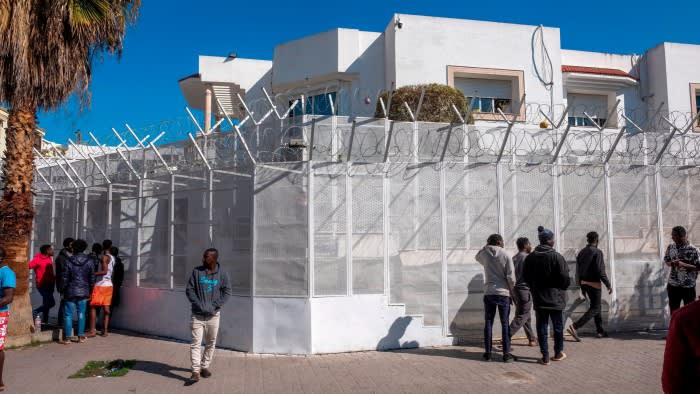
Unlock the Editor’s Digest for free
Roula Khalaf, Editor of the FT, selects her favourite stories in this weekly newsletter.
The EU plans to provide up to €164.5mn over three years to Tunisian security forces, some of whom have been accused of human rights abuses, far more than has been made public as Brussels boosts its anti-migration drive.
The funding comes as the bloc faces political pressure to cut arrival numbers, prompting an increase in funding for countries from which people depart to Europe despite concerns about their treatment of migrants and asylum seekers.
Brussels pledged €105mn of migration-related funding to Tunis in an agreement signed last year, much of which has not yet been disbursed, said people familiar with the matter.
But figures seen by the Financial Times show that the EU will overall spend far more on migration under different funding streams over the next three years, with about two-thirds of a projected €278mn allocated to security and border management. The rest will fund schemes such as returning migrants to their home countries, fighting people-smuggling and protecting refugees.
EU-funded programmes involving Tunisian security forces include a training academy for the country’s national maritime guard, implemented with German federal police.
EU funds will also pay for equipment such as radars and boats for the national guard, along with land border posts, the people said.
Tunisian security forces have increased interceptions of boats in the Mediterranean since migrant arrivals in Italy rose last August. About 81,000 people were intercepted making the sea journey last year, more than double the number the previous year, according to the Tunisian Forum for Economic and Social Rights (FTDES).
Members of Tunisia’s security forces have been implicated in widespread unlawful detentions and expulsions of migrants and asylum seekers, according to European diplomats, international humanitarian staff and non-government organisations.
“Since last August, the Tunisian authorities have a new expulsion mechanism, meaning that all those intercepted at sea are automatically expelled towards the Algerian and especially the Libyan borders,” said Romdhane Ben Amor, spokesperson for the FTDES.
“For those expelled to the Libyan borders, [this] ends with them being captured in detention centres or prisons,” he added.
The UN in 2023 found that Libyan security forces and armed militia groups, including forces that also benefit from EU funds, may have been implicated in war crimes and crimes against humanity, including the imprisonment, enslavement and torture of migrants and asylum seekers. At least 7,000 people have been sent from Tunisia to the border with Libya since last summer, officials said.
EU rules ban the bloc from funding measures “which may result in violations of human rights in partner countries”.
The EU ombudsman is investigating how the bloc will ensure its funds in Tunisia are not used for breaches of human rights.
Despite the allegations, the EU and its member states are wary of exerting pressure on Tunisian authorities because they fear losing communication channels and are concerned migrant numbers could rise again, prompting political problems at home.
An Italian government official said it was important for Europe to continue engaging with Tunisian authorities to tackle security threats and stem the influence of rival powers across the region. “We are applying gentle pressure, but blackmail does not work,” the official said.
The Tunisian foreign ministry has denied violating the rights of migrants and said that “persons intercepted at sea or in an irregular situation are treated in accordance with national legislation and Tunisia’s international commitments”.
The European Commission said it was in contact with Tunisian authorities and was “closely following the situation of migrants in Tunisia and at the borders with Algeria and Libya”.
This month, the EU signed further agreements with African countries to prevent migration to Europe despite human rights concerns. It pledged €210mn to Mauritania, including €60mn for migration, and €7.4bn to Egypt, with at least €200mn explicitly for migration measures.
In Tunisia, the EU last year also pledged €150mn in general budget support separate from migration, which was paid out this month.
Read More: World News | Entertainment News | Celeb News
FT









